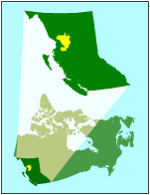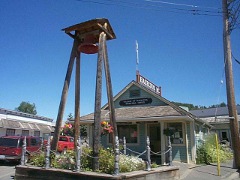Literacy Outcomes of Community Intervention
Storyteller's Foundation
Hazelton, BC
Our initial research problem

We are interested in exploring how to measure the literacy outcomes of community development projects. More specifically, we want to develop and test tools that allow us to demonstrate that involvement in community development programs increases solidarity among learners which in turn increases literacy outcomes for participants.
The community and context for our research
Our work is situated in a remote, rural region of northwest British Columbia where almost 87% of the population is First Nations. The cultural values of our region centre on creating and maintaining relationships and alliances between people and people and the environment.
Where we live, a healthy community requires individuals to hold competencies such as oral skills as well as literacy skills that increase their social capital. An OECD study on the Definition and Selection of Competencies explains the importance of building social capital:
The building of social capital is important, as existing social bonds weaken and new ones are created by those with the ability to form strong networks. One of the potential sources of inequity in the future could be differences in the competence of various groups to build and benefit from social capital. (OECD: Definition and Selection of Competencies Project Executive Summary. 2003, p. 12.)
In the Learning Shop (our storefront, community learning centre pictured below) we immerse learners in a social network to help increase their sense of trust and solidarity. This means that an individual must know how to build intentional relationships, hold trust in alliances and understand and practice reciprocity. An individual requires skills in literacy in order to live within an increasingly diverse society. This results in learners developing a sense of belonging and ownership to their community. We believe that trust and solidarity are so closely tied to literacy it is difficult to separate them.
A unique approach to literacy

We have developed programming, termed community development learning, that is unique to the cultural context of our region. The participants build literacy skills while working within existing community development projects. By involving the participant in community development work we are expanding their social networks by helping them build new (or deepen existing) relationships. By supporting participants to share in the decision-making around these projects we are helping them to see themselves as part of “the glue” of their society.
We feel that most literacy measurement tools that we have encountered do not fully capture the competencies our programming helps to develop. After reading the Canadian Council on Learning’s report on how success is measured in aboriginal communities we are more assured of the need for and importance of measuring culturally relevant competencies.
Individual development and personal responsibility are viewed within the larger context of contributing to the collective. Aboriginal learning can be viewed as a process that naturally builds on social capital—a term that generally refers to the development of social relationships and networks based on trust and shared values that ultimately foster community well-being. (Redefining How Success is Measured in First Nations, Inuit and Métis Learning, Report on Learning in Canada 2007,Ottawa: 2007, p. 5).
This research project is allowing us to articulate and build tools to monitor how increased solidarity with others leads to increased literacy outcomes.
Our refined research question
How does this tool (that we have built within the project) show/demonstrate progress in trust and solidarity among learners? More specifically, how does it provide evidence of literacy progress?

